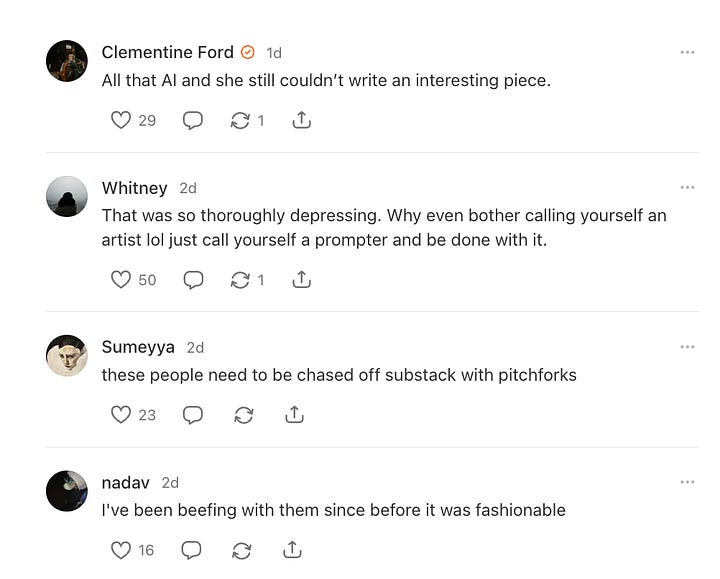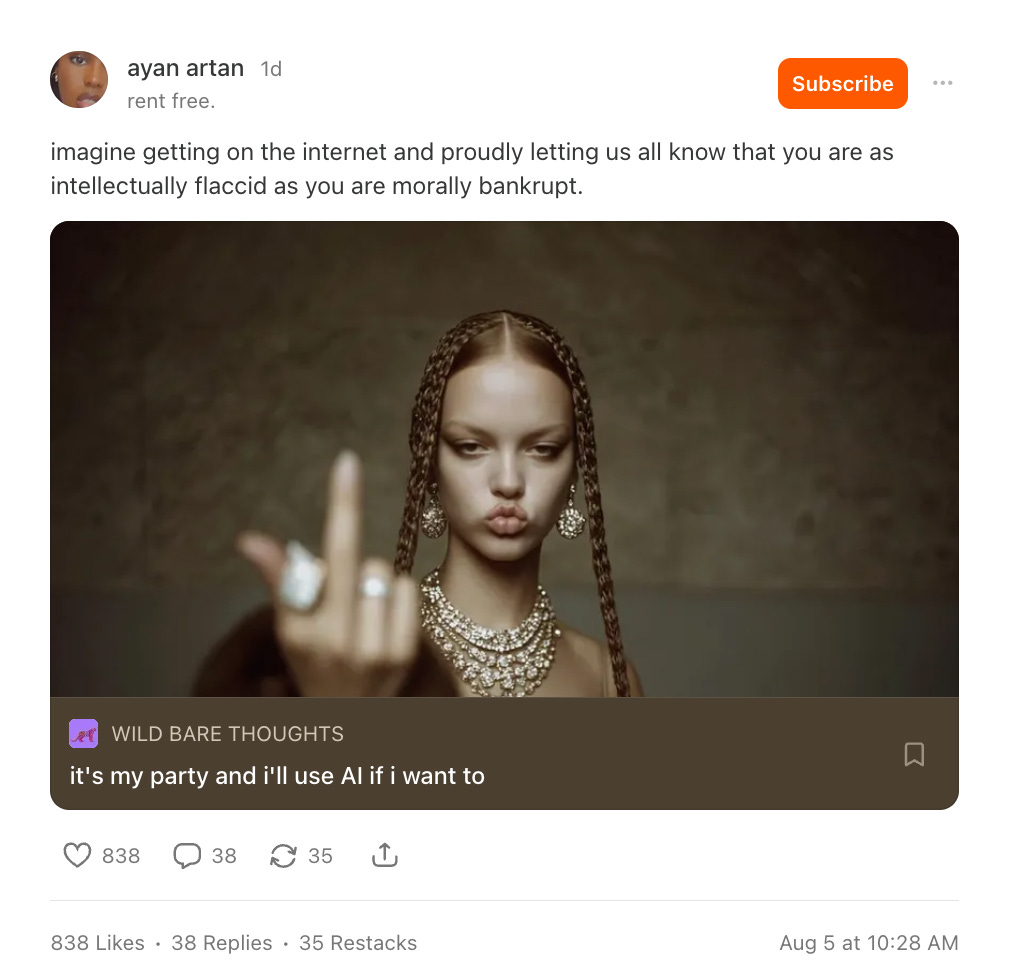AI is the new printing press
how the loudest critics are just playing their part in the same old cycle
About every four to five weeks, like clockwork, a new wave of people finds one of my essays where I mention using AI, and they lose their minds. It’s always a different crowd, but the talking points are identical. This is soulless. This is slop. This is cheating. They insist anyone using AI must be unskilled, unthinking, unworthy of taking up creative space.
They’ll post screenshots with long captions about the death of art, the erosion of humanity, the tragic decline of culture, as if they uncovered some dark secret instead of reading a public essay I already published and stood behind.
But what made this week’s wave extra surreal—and why I’m writing this follow-up—is that one of the people publicly mocking me has over 100,000 Substack subscribers. Someone I actually respected. I was literally subscribed to her.
She restacked one of my essays where I discuss the ways I’ve used AI creatively, and wrote: “you couldn’t waterboard this out of me actually”
Not “I disagree.” Not a counterpoint. Just pure performative revulsion over a tool. A tool I’ve been using transparently and intentionally—for years.


These are the same people who say they support creativity, but the second your process threatens their sense of control, it’s open season.
I used to find it stressful, now I just find it predictable. Boring, even. Because at some point you realize, none of this is new. People have always panicked when new tools appear. Especially the ones that threaten legacy status systems.
The printing press was heresy. Electricity was witchcraft. The camera was blasphemy. Synthesizers were cheating. The internet was a joke. The smartphone would melt your brain. And now, AI is “soulless.” “Dangerous.” “Slop.”
We go through this cycle every time a tool shows up that makes something faster, cheaper, or more accessible. The establishment mocks it. Then fears it. Then tries to regulate it. Then adopts it. Then pretends they loved it all along. It’s never really about the tool. It’s about control.
Take the printing press. Before Gutenberg, books were hand-copied by scribes—rare, expensive, and largely controlled by the Church. Literacy was limited. Information moved slowly. Power stayed concentrated. The elites didn’t see a problem. Then came movable type.
Suddenly, knowledge scaled. Ideas could be reproduced. Books traveled. Literacy surged. And the establishment panicked. The Church banned certain books. Governments cracked down. The tool was called dangerous, corrupting, a threat to civilization.
They weren’t wrong. It was a threat—to their civilization. The one where access to knowledge was a privilege, not a right. The one where power was inherited, not earned. But the printing press still won. It always does.
AI is another Gutenberg moment.
A decentralizing force. A tool that makes average people more capable of expressing complex ideas at scale. And just like last time, the people who benefited most from the old system are the ones screaming the loudest about the new one.
Most of the people yelling about “AI slop” have never built anything scalable. They’ve confused tradition with virtue. They think using a modern tool invalidates the outcome—even as they post their outrage from smartphones running on tools and systems they don’t understand, built by engineers they’d dismiss in their writing workshops.
What’s always wild is how few of these people engage with what I actually wrote. They just perform disgust. They don’t quote a paragraph or critique a claim—they simply sneer and ride the reaction wave. Not debate. Not disagreement. Just ritualized shaming over a tool they don’t understand.
And the irony (and hilarity) is that the most recent wave of outrage surrounding this resurfaced piece from June—people saying I’m morally bankrupt, artistically fraudulent, or “couldn’t write an interesting piece even with AI”—reads like performance art when you realize everything they’re reacting to… was already addressed in the piece itself.
They didn’t notice—or maybe they just didn’t care—that every single one of their talking points had already been anticipated and addressed. The essay they’re mocking literally outlines the history of this pattern.
So when people say using AI makes the work “soulless,” I don’t get defensive anymore. I just assume they’ve never tried to build anything in the real world. Because anyone who ‘s built something real—anyone who’s shipped, scaled, or self-funded their creative practice—knows tools matter, and good tools are rare. When one comes along that lets you spend less time in the weeds and more time in synthesis—you use it.
You don’t have to like the new tools. You don’t have to use them. But don’t mistake your discomfort for integrity. And don’t confuse your attachment to friction with some kind of moral depth.
If your entire identity is rooted in suffering through your process, that’s your choice. But don’t project that onto people who’ve learned how to build with clarity and leverage. I don’t write to suffer. I write to express. And I’ll use whatever tools sharpen that expression. Full stop.
Every tool that changed the world was first dismissed as lazy, evil, dangerous, or fake.
Every time, the tool won.
And every time, the people who wasted energy resisting it were quietly left behind.
AI won’t replace writers. But writers who use AI will replace writers who don’t. And no amount of “soul-posting” is going to change that.
XO, STEPF










Well said (and with undeniable style—AI-assisted or not). Either we're both wrong or both right...but either way, I agree!
Conceived, written, and posted in CT, USA, without assistance in this case.
Many people don't want better, rather they want exclusion. It's one of the worst aspects of human behaviour that many people who achieve some level of wealth or success then use their resources primarily to pursue exclusion.